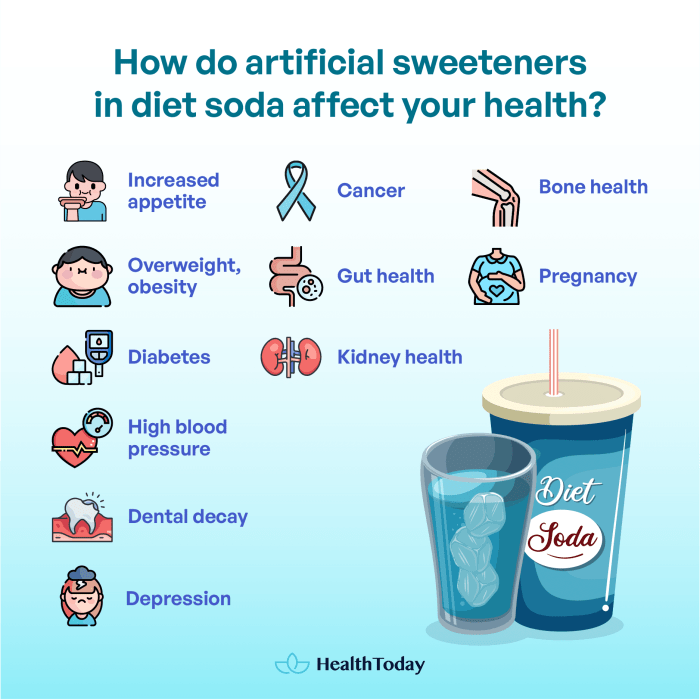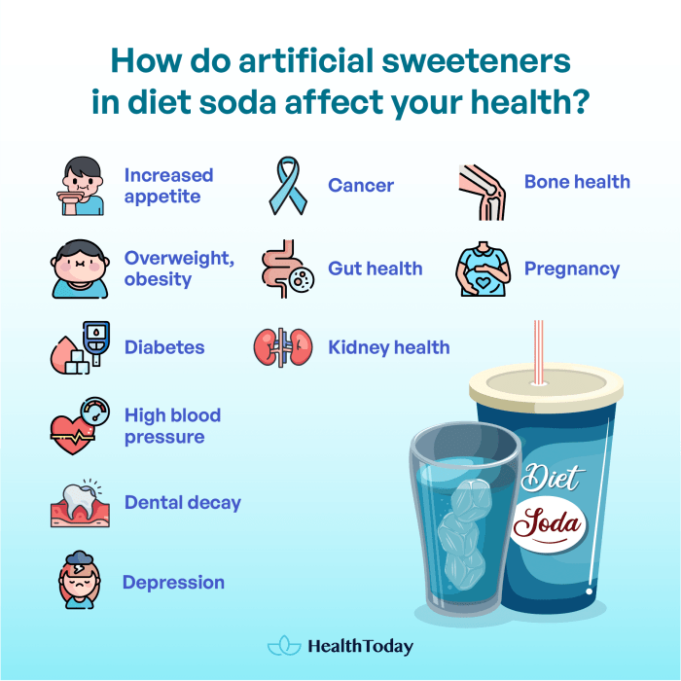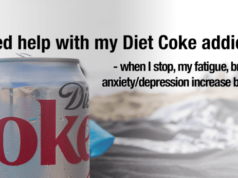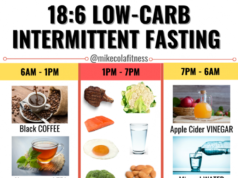Can diet soda raise blood sugar? This question has sparked debate among health experts and consumers alike. While diet soda is marketed as a sugar-free alternative, its impact on blood sugar levels remains a topic of ongoing research. The artificial sweeteners found in these beverages can trigger complex hormonal responses in the body, potentially affecting insulin sensitivity and glucose metabolism.
Studies have investigated the link between diet soda consumption and blood sugar fluctuations, revealing intriguing findings. Some research suggests that diet soda may not directly raise blood sugar levels but could contribute to insulin resistance over time. This is because artificial sweeteners can disrupt the body’s natural insulin regulation, potentially leading to a decreased ability to process glucose effectively.
The Science Behind Diet Soda and Blood Sugar
While diet soda contains no sugar, its impact on blood sugar levels is a subject of ongoing research and debate. Artificial sweeteners, the sugar substitutes found in diet soda, can trigger hormonal responses in the body that might influence blood sugar regulation.
Artificial Sweeteners and Hormonal Response, Can diet soda raise blood sugar
Artificial sweeteners are designed to mimic the sweet taste of sugar without providing calories. However, their effect on the body’s hormonal response, particularly insulin and glucagon, is not entirely clear.
Insulin is a hormone that lowers blood sugar levels by helping glucose enter cells for energy. Glucagon, on the other hand, raises blood sugar levels by stimulating the release of glucose from the liver.
Studies suggest that artificial sweeteners, including those found in diet soda, can trigger a small but measurable increase in insulin levels, even though they don’t contain sugar. This response is thought to be due to the brain’s perception of sweetness, which can trigger a cascade of hormonal events. Some studies have also shown that artificial sweeteners may suppress glucagon release, further contributing to potential fluctuations in blood sugar.
Studies Investigating the Link Between Diet Soda and Blood Sugar
Several studies have explored the link between diet soda consumption and blood sugar levels. A 2015 study published in the journal “Diabetes Care” found that people who drank diet soda regularly had higher levels of fasting blood glucose and were more likely to develop type 2 diabetes compared to those who did not consume diet soda. However, it’s important to note that this study did not establish a causal relationship between diet soda consumption and diabetes.
Other studies have shown mixed results. Some have found no significant association between diet soda intake and blood sugar levels, while others have reported a potential increase in blood sugar after consuming diet soda. These conflicting findings highlight the need for further research to fully understand the complex relationship between diet soda and blood sugar regulation.
Potential Mechanisms of Diet Soda’s Impact on Blood Sugar
While the exact mechanisms by which diet soda might influence blood sugar levels are still being investigated, several potential pathways have been proposed.
Gut Microbiome Changes
The gut microbiome, the trillions of bacteria that reside in the digestive tract, plays a crucial role in metabolism and blood sugar regulation. Some studies suggest that artificial sweeteners in diet soda may disrupt the balance of gut bacteria, potentially leading to changes in glucose metabolism and insulin sensitivity.
Altered Glucose Metabolism
Artificial sweeteners may also interfere with glucose metabolism directly. Some research suggests that these sweeteners can activate certain receptors in the body that are involved in glucose uptake and utilization, potentially leading to altered blood sugar responses.
Diet Soda and Insulin Resistance
While diet soda doesn’t contain sugar, its impact on insulin sensitivity is a subject of ongoing research. Studies suggest a possible link between diet soda consumption and insulin resistance, a condition where the body doesn’t respond properly to insulin, leading to higher blood sugar levels.
Effects of Different Beverages on Insulin Sensitivity
The impact of different beverages on insulin sensitivity can vary.
- Regular soda: Contains high amounts of sugar, which triggers a rapid spike in insulin levels. This can lead to insulin resistance over time.
- Diet soda: Contains artificial sweeteners that don’t raise blood sugar levels directly. However, some research suggests that artificial sweeteners may disrupt the body’s natural insulin regulation.
- Water: Doesn’t contain any sugar or artificial sweeteners and doesn’t affect insulin sensitivity.
Research Findings on Diet Soda and Insulin Resistance
Several studies have investigated the association between diet soda consumption and insulin resistance.
- A study published in the journal *Diabetes Care* in 2013 found that individuals who consumed more than two diet sodas daily had a higher risk of developing metabolic syndrome, a cluster of conditions that increase the risk of heart disease, stroke, and type 2 diabetes. Metabolic syndrome often includes insulin resistance.
- Another study, published in the *American Journal of Clinical Nutrition* in 2015, found that individuals who consumed diet soda regularly had a higher risk of developing type 2 diabetes, even after adjusting for other factors such as weight, physical activity, and diet.
Potential Role of Artificial Sweeteners in Disrupting Insulin Regulation
Artificial sweeteners, found in diet soda, may disrupt the body’s natural insulin regulation in several ways:
- Altered gut microbiome: Some research suggests that artificial sweeteners may alter the composition of the gut microbiome, which plays a role in regulating insulin sensitivity.
- Increased appetite and cravings: Artificial sweeteners may not trigger the same satiety signals as sugar, leading to increased appetite and cravings, which can contribute to weight gain and insulin resistance.
- Hormonal changes: Some studies suggest that artificial sweeteners may disrupt the production of hormones involved in regulating insulin sensitivity, such as leptin and ghrelin.
Diet Soda and Blood Sugar Spikes
While diet soda doesn’t contain sugar, it can still potentially trigger blood sugar spikes in some individuals. This is a complex issue influenced by a variety of factors, including individual metabolism and the presence of other food components.
Potential Triggers for Blood Sugar Spikes
The presence of artificial sweeteners in diet soda can lead to hormonal changes that may mimic the response to real sugar. Even though the body doesn’t process artificial sweeteners the same way as sugar, the taste and expectation of sweetness can trigger the release of insulin, the hormone responsible for regulating blood sugar levels. This can lead to a temporary drop in blood sugar, followed by a rebound spike as the body attempts to restore balance.
- Individual Variations in Metabolism: Individuals with varying levels of insulin sensitivity may experience different responses to diet soda. Those with insulin resistance, a condition where the body doesn’t respond effectively to insulin, may be more prone to blood sugar fluctuations after consuming diet soda. This is because their bodies may struggle to regulate blood sugar levels, even in the absence of real sugar.
- Presence of Other Food Components: Consuming diet soda alongside other foods, particularly those high in carbohydrates, can further contribute to blood sugar spikes. The combination of artificial sweeteners and carbohydrates can trigger a more pronounced insulin response, leading to a greater fluctuation in blood sugar levels.
Learned Response and Hormonal Changes
The body’s response to diet soda can be influenced by a “learned response.” Over time, the body may associate the taste of artificial sweeteners with the anticipated sugar spike, even though no actual sugar is present. This learned response can trigger hormonal changes, including the release of insulin, leading to fluctuations in blood sugar levels.
Investigating the Effects of Diet Soda on Blood Sugar Levels
A study to investigate the immediate and delayed effects of diet soda consumption on blood sugar levels in individuals with varying levels of insulin sensitivity could be designed as follows:
- Participants: Recruit individuals with different levels of insulin sensitivity, as determined by fasting blood glucose levels and HbA1c testing.
- Study Design: A randomized, double-blind, crossover study where participants are randomly assigned to consume either diet soda or a control beverage (water or sugar-sweetened beverage) on different days.
- Blood Glucose Monitoring: Monitor blood glucose levels at baseline, immediately after consumption, and at regular intervals for several hours after consumption.
- Data Analysis: Analyze the data to determine the immediate and delayed effects of diet soda consumption on blood glucose levels in individuals with different levels of insulin sensitivity.
This study would help to understand the potential impact of diet soda on blood sugar regulation in different individuals and provide valuable insights into the mechanisms behind these effects.
The Role of Individual Factors: Can Diet Soda Raise Blood Sugar
While the research on diet soda and blood sugar is ongoing, it’s crucial to remember that individual factors play a significant role in how our bodies respond to these beverages. Factors like age, genetics, and overall diet can influence the impact of diet soda on blood sugar levels.
Factors Influencing Blood Sugar Response
It’s essential to understand that everyone’s body reacts differently to food and beverages, including diet soda. The following table illustrates how various factors can influence the impact of diet soda on blood sugar:
| Factor | Impact | Example |
|---|---|---|
| Age | Older adults may be more susceptible to blood sugar fluctuations after consuming diet soda. | A 65-year-old individual with pre-diabetes might experience a more pronounced rise in blood sugar after consuming diet soda compared to a younger individual. |
| Genetics | Individuals with a family history of diabetes or insulin resistance may be more prone to experiencing blood sugar changes after consuming diet soda. | A person with a genetic predisposition to diabetes might be more sensitive to the effects of artificial sweeteners in diet soda. |
| Overall Diet | A diet high in processed foods, sugar, and unhealthy fats can contribute to insulin resistance, making individuals more susceptible to blood sugar fluctuations after consuming diet soda. | An individual who consumes a diet rich in sugary drinks and fast food may experience a more significant blood sugar spike after consuming diet soda compared to someone who follows a balanced and healthy diet. |
Health Conditions Influencing Blood Sugar Response
Certain health conditions can make individuals more sensitive to blood sugar fluctuations after consuming diet soda. These conditions include:
- Diabetes: Individuals with diabetes, especially type 2 diabetes, may experience blood sugar spikes after consuming diet soda, even though it contains no sugar.
- Pre-diabetes: People with pre-diabetes are at an increased risk of developing type 2 diabetes. They may also experience blood sugar fluctuations after consuming diet soda.
- Insulin resistance: Insulin resistance is a condition where the body does not respond properly to insulin, a hormone that regulates blood sugar levels. Individuals with insulin resistance may experience blood sugar spikes after consuming diet soda.
- Metabolic syndrome: Metabolic syndrome is a cluster of conditions that increase the risk of heart disease, stroke, and type 2 diabetes. Individuals with metabolic syndrome may be more susceptible to blood sugar fluctuations after consuming diet soda.
Importance of Individual Assessment
The impact of diet soda on blood sugar can vary significantly from person to person. It’s crucial to consider individual health history, lifestyle, and any pre-existing conditions when evaluating the effects of diet soda on blood sugar. Consulting with a healthcare professional is recommended to understand how diet soda might affect your specific health needs.
Alternative Beverages and Blood Sugar

When it comes to managing blood sugar levels, the beverages we choose play a crucial role. While diet soda might seem like a sugar-free option, its effects on blood sugar and overall health are complex and warrant careful consideration. Understanding the impact of different beverages on blood sugar can help us make informed choices that support our well-being.
Comparing Beverage Effects on Blood Sugar
To understand the effects of various beverages on blood sugar levels, it’s helpful to compare them side-by-side:
- Diet Soda: While diet soda is sugar-free, its artificial sweeteners can still trigger changes in gut bacteria, potentially impacting insulin sensitivity and blood sugar regulation. Some studies suggest that regular consumption of diet soda may be linked to increased insulin resistance and higher blood sugar levels over time.
- Regular Soda: Regular soda is loaded with sugar, leading to rapid spikes in blood sugar levels. This can strain the pancreas, which produces insulin to regulate blood sugar, and contribute to insulin resistance in the long run.
- Water: Water is the most ideal beverage for blood sugar management. It’s calorie-free, doesn’t contain sugar, and doesn’t trigger any hormonal responses related to blood sugar regulation.
- Other Sugar-Free Beverages: Sugar-free beverages like unsweetened tea, black coffee, and sparkling water are generally good choices for blood sugar control. However, it’s important to be mindful of added ingredients, such as artificial sweeteners or flavorings, which may vary in their effects on blood sugar.
Healthy Alternatives to Diet Soda
Choosing healthy alternatives to diet soda can help maintain stable blood sugar levels and promote overall health:
- Water: Water is the foundation of good health and plays a crucial role in blood sugar regulation. Staying adequately hydrated helps maintain proper blood sugar levels and prevents dehydration, which can contribute to blood sugar fluctuations.
- Unsweetened Tea: Green tea, black tea, and herbal teas are excellent choices for their antioxidant properties and potential benefits for blood sugar control. They’re naturally sugar-free and can contribute to a healthy diet.
- Black Coffee: Black coffee, without added sugar or sweeteners, can be a good option for some individuals. It can provide a caffeine boost without significantly impacting blood sugar levels.
- Sparkling Water: Sparkling water provides a refreshing alternative to sugary drinks and can be enhanced with natural flavors like lemon, lime, or cucumber.
Benefits of Water and Sugar-Free Beverages
Consuming water and other sugar-free beverages offers several benefits for overall health and blood sugar management:
- Hydration: Adequate hydration is essential for optimal bodily functions, including blood sugar regulation. Water helps to transport glucose to cells and maintain proper blood sugar levels.
- Calorie Control: Water and sugar-free beverages are calorie-free, contributing to weight management and reducing the risk of weight gain, which can worsen insulin resistance and blood sugar control.
- Reduced Sugar Intake: Avoiding sugary drinks significantly reduces sugar intake, preventing blood sugar spikes and minimizing the strain on the pancreas.
- Improved Insulin Sensitivity: Regular consumption of water and sugar-free beverages can help improve insulin sensitivity, allowing the body to utilize glucose more effectively.
End of Discussion
The effects of diet soda on blood sugar levels are complex and influenced by individual factors, including genetics, age, and overall diet. While diet soda may not directly cause immediate blood sugar spikes, its long-term impact on insulin sensitivity and glucose metabolism remains a subject of ongoing research. For those concerned about blood sugar control, opting for water or other sugar-free beverages might be a safer choice. Understanding the potential implications of diet soda consumption is crucial for making informed decisions about our health and well-being.
Answers to Common Questions
Does diet soda affect my gut health?
Some research suggests that artificial sweeteners in diet soda can alter the composition of the gut microbiome, potentially impacting digestion and overall health. However, more research is needed to fully understand the long-term effects on gut health.
Can diet soda lead to weight gain?
While diet soda is calorie-free, studies have shown mixed results regarding its impact on weight. Some research suggests that diet soda may be linked to increased cravings for sweet foods and potentially contribute to weight gain.
Is diet soda safe for pregnant women?
The safety of diet soda during pregnancy is a subject of debate. Some studies suggest that artificial sweeteners may cross the placenta and potentially affect fetal development. It’s best to consult with a healthcare professional for personalized advice.
While diet soda is marketed as sugar-free, its impact on blood sugar levels is still debated. Some studies suggest that artificial sweeteners can trigger insulin release, potentially contributing to sugar cravings and metabolic changes. It’s interesting to note that the 1980s saw a surge in popularity for diet pills, many of which contained stimulants and appetite suppressants, like popular diet pills in the 80s.
Ultimately, whether or not diet soda raises blood sugar is a complex issue with no definitive answer.
While diet soda doesn’t contain sugar, it can still impact your blood sugar levels. Artificial sweeteners can trigger insulin release, which can lead to cravings and potentially weight gain. If you’re looking to gain weight healthily, it’s important to focus on a balanced diet rich in nutrient-dense foods.
A good starting point is to research the best diet to gain weight for your specific needs and goals. Remember, managing your blood sugar levels is crucial for overall health, regardless of your weight goals.
While diet soda is typically marketed as a sugar-free option, some studies suggest it may still impact blood sugar levels. The artificial sweeteners in these beverages can trigger insulin release, which can ultimately affect glucose metabolism. It’s important to remember that food choices for our furry friends matter too.
If you’re wondering about the quality of Science Diet for your cat, you can find more information on this topic here: is science diet good for cats. Just like with diet soda, understanding the potential impact of a cat’s diet on their overall health is crucial.
























